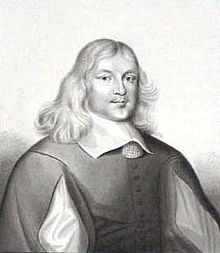John Bradshaw (judge)
|
Lord President of the Council of State John Bradshaw |
|
|---|---|

John Bradshaw
|
|
| President of the Council of State | |
|
In office 12 March 1649 – 29 December 1651 |
|
| Preceded by | Pro tempore Oliver Cromwell |
| Succeeded by | Bulstrode Whitelocke |
| Lord President of High Court of Justice | |
|
In office 10 January 1649 – 30 January 1649 |
|
| Chancellor of the Duchy of Lancaster | |
|
In office 1658–1659 |
|
| Preceded by | Thomas Fell |
| Succeeded by | William Lenthal |
| Chancellor of the Duchy of Lancaster | |
|
In office 1649–1654 |
|
| Preceded by | Gilbert Gerrard |
| Succeeded by | Thomas Fell |
| Chief Justice of Chester and North Wales | |
| Preceded by | Sir Thomas Milward |
| Succeeded by | Sir Timothy Turner |
| Personal details | |
| Born | 15 July 1602 Wyberslegh Hall |
| Died | 31 October 1659 (aged 57) Westminster Abbey |
| Resting place | Initially, Westminster Abbey |
| Spouse(s) | Mary Marbury |
| Education | King's School, Macclesfield |
| Alma mater | Gray's Inn |
John Bradshaw (15 July 1602 – 31 October 1659) was an English judge. He is most notable for his role as President of the High Court of Justice for the trial of King Charles I and as the first Lord President of the Council of State of the English Commonwealth.
John Bradshaw (sometimes spelt Bradshawe) the second son of Henry Bradshaw and Catherine Winnington was born in 1602 probably at Wybersley (Wyberslegh) Hall in the village of High Lane near , Cheshire, or possibly at the nearby Peace Farm, Marple (his father farmed at both) and baptised on 10 December in . As a child he attended the free school at Stockport, as well as schools in Bunbury, Cheshire, and Middleton. During his teenage years he also attended The King's School, Macclesfield. According to local tradition he wrote the following inscription on a gravestone at either Macclesfield or Bunbury:
He was articled as clerk to an attorney in Congleton. Almost opposite the town hall, the White Lion public house bears a blue plaque, placed by the Congleton Civic Society, which reads: "The White Lion, built 16–17th century. Said to have housed the attorney's office where John Bradshaw, regicide, served his articles."
After studying English law in London, he was called to the bar at Gray's Inn on 23 April 1627. He served on the provincial bar of Congleton until he became mayor in 1637.John Milton wrote highly of Bradshaw's aptitude during his public service, saying that "All his early life he was sedulously employed in making himself acquainted with the laws of the country; he then practiced with singular success and reputation at the bar."
...
Wikipedia
